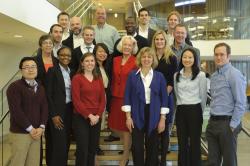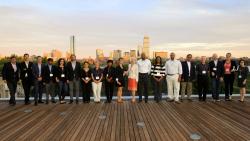Albright Challenge
Background
The problems of the 21st Century are complex, over-lapping and universal. It is the strong belief of MIT Collaborative Initiatives that these issues should be tackled in concert not independently, through collaboration not in isolation.
In order to do this effectively we need strong leaders who recognize, foster and share innovation: Leaders who understand the value of prevention in terms of identifying and avoiding foreseeable crisis: Leaders who are open to reaching beyond their own areas of expertise to find creative, productive answers to critical issues.
Our plan is to convene rising leaders, the best and the brightest, from varied backgrounds to create a dynamic collaborative environment around a critical issue. The focus of the Challenge will be an intense 5-day working session based at MIT. In that session our leaders will be put into teams of 8-10 people and given a specific challenge to work through. The sessions will be facilitated using design methodology uniquely suited to managing complex problems and promoting idea generation. The teams will also be given an opportunity to work with some of the most powerful leaders of our time in small group or lecture settings.
We are looking to the long-term and we will put processes in place to maintain contact with participants and to enable us to develop any promising outcomes of the Challenge.
Advisors
- Norm Augustine Ret Chairman and CEO Lockheed Martin Corp
- The Honorable Michael Bloomberg Mayor of New York City
- Gary Hirshberg Chairman Stonyfield Farms
- General Patricia Horoho Surgeon General US Army
- Muhtar Kent Chairman and CEO Coca-Cola Company
- Robert Langer Institute Professor MIT
- Admiral and Mrs. Michael Mullen Fmr Chairman of the Joint Chiefs of Staff
- Madge Meyer Fmr EVP and Chief Innovation Officer State Street Corporation
- Darryl Rhea, Rhea Insight
- Marco Steinberg Director Strategic Design SITRA Finnish Innovation Fund
Quotes from New Models 5 meeting
“You get all these smart people together, and they think they’re going to somehow, think their way into new acting. And it almost never happens. You have to turn it around and create some action and combinations of people so that instead, they can act their way into new thinking.”
Edward M. Hundert, MD, Division of Medical Ethics, Harvard Medical School
“You can tell who a leader is, even if they’re not in a “leadership position” – and that is someone who feels responsible for everything.”
Denis A. Cortese, MD, Foundation Professor, Arizona State University, W.P. Carey School of Business; Fmr President and CEO, Mayo Clinic
“I’m actually a pretty strong advocate for change because we’re changing whether we know it or not and we have to change for the future, no matter how well things are going or how poorly things are going, we’ve got to advocate for what we need, to make our investments based on that.”
Michael G. Mullen, Admiral, Fmr Chairman of the Joint Chiefs of Staff



